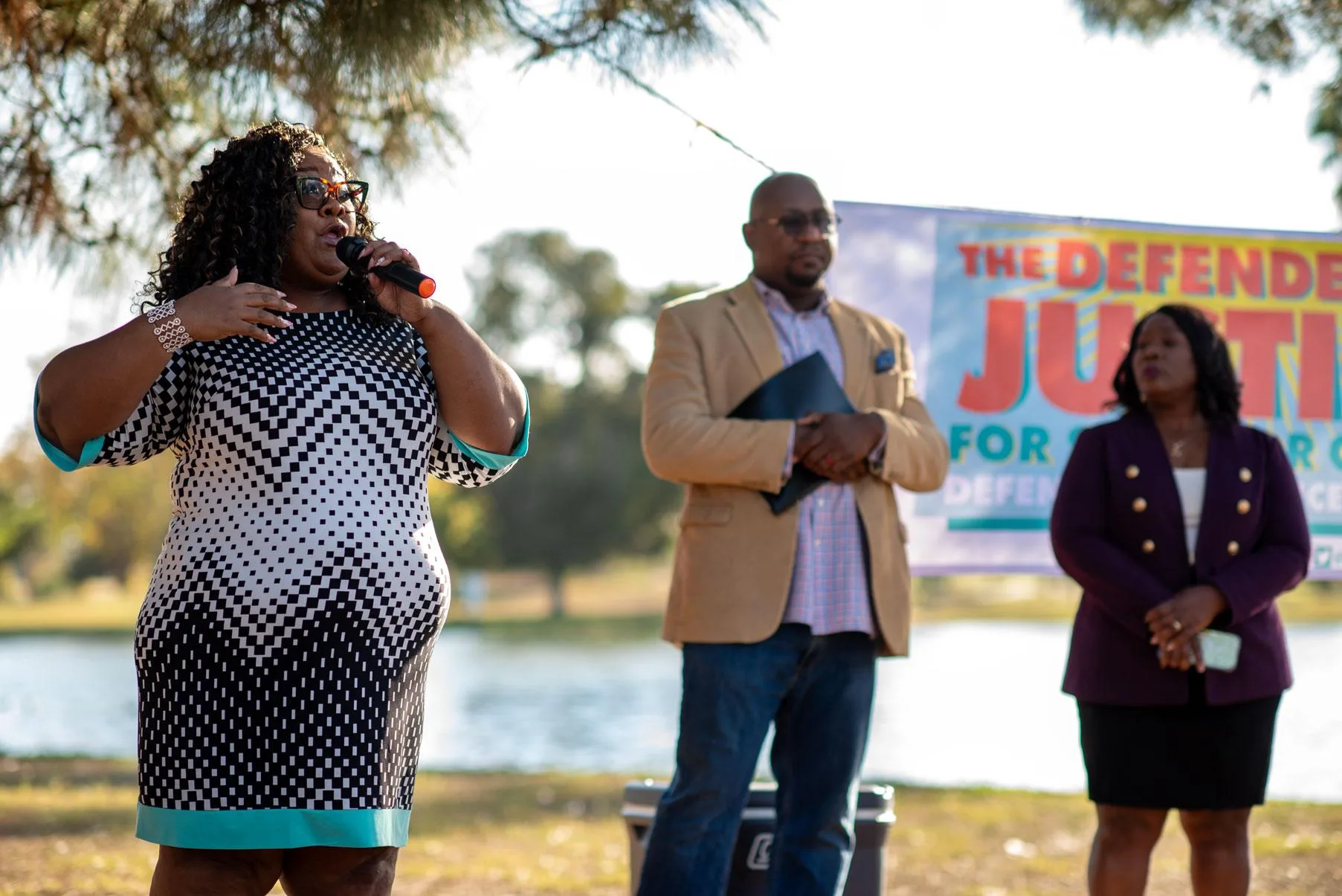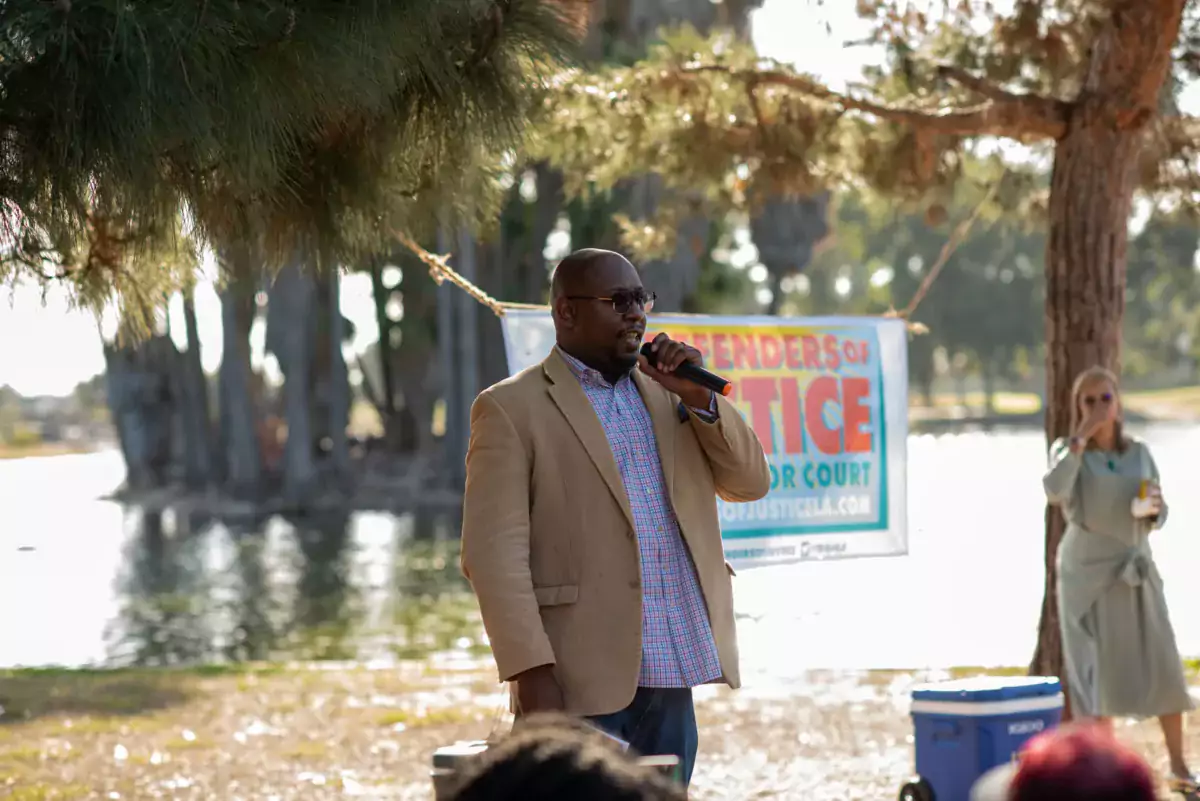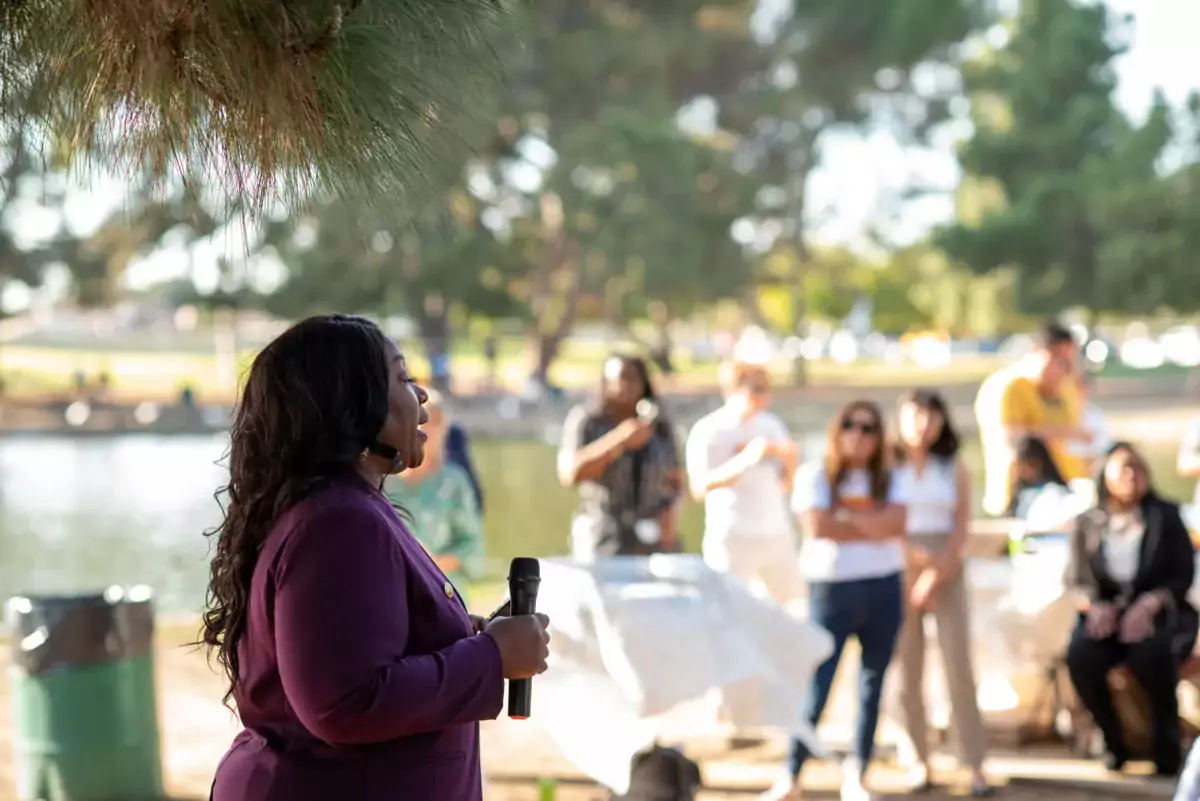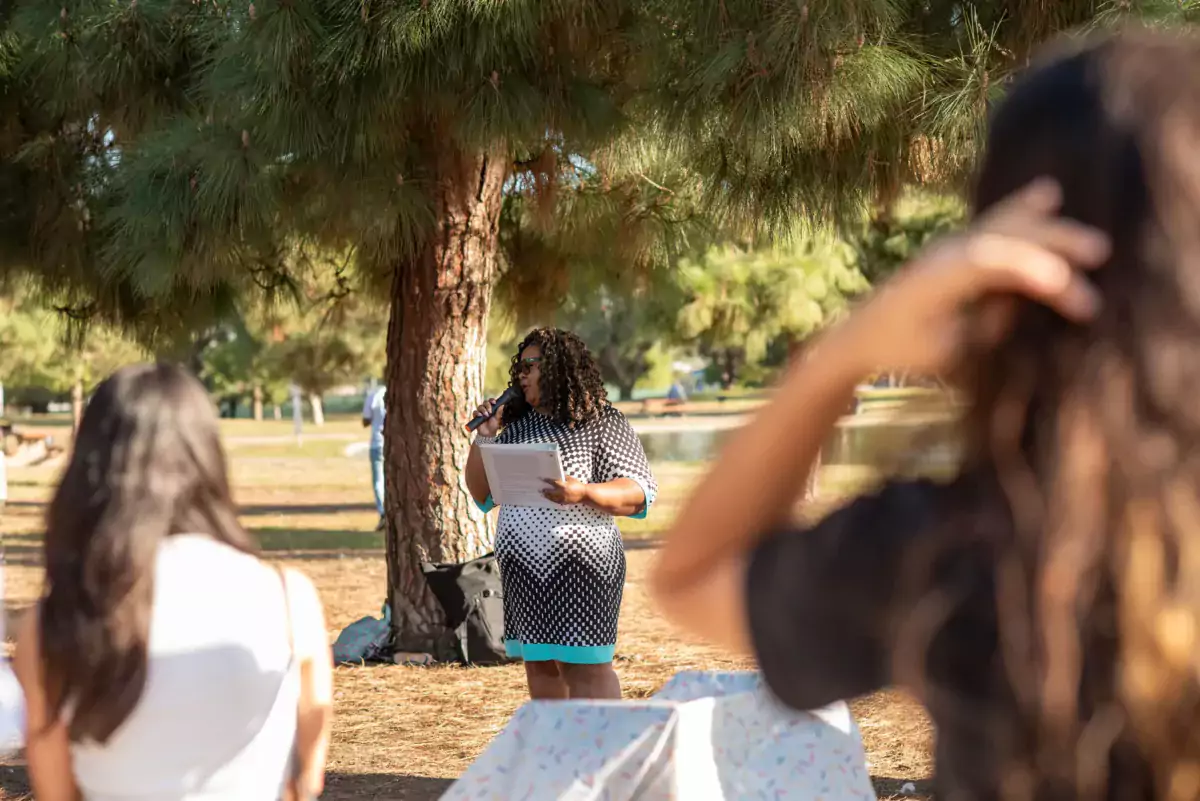Public Defenders Running for Judge Want to Reduce Mass Incarceration in Los Angeles
Five public defenders are running for seats on the Los Angeles Superior Court. Tomorrow, voters will decide whether to elect candidates who support alternatives to incarceration—or maintain the status quo.

Newsrooms and voters tend to overlook judicial elections—despite the tremendous power judges hold in the criminal legal system. Los Angeles elected its first Black public defender, Holly Hancock, as a Superior Court judge in 2022, after Hancock promised to prioritize community well-being by supporting alternatives to incarceration.
Now, five public defenders are running for seats on the county’s Superior Court on March 5’s primary election.
Judges play a key role in the criminal justice system. They have the power to decide whether to send someone to prison—or to alternative programs, such as a rehabilitation facility. Judges can decide how long to send people to prison. They can decide whether someone will go to jail as their criminal case proceeds, or whether they can get out on bail.
In Los Angeles, Superior Court judges hear cases involving civil family law, children accused of breaking the law, people accused of crimes, and traffic incidents.
The Los Angeles Superior Court has nearly 500 judges. The judges serve six-year terms. Most Superior Court judges are appointed by the governor, and most of those judges secure their subsequent terms unopposed. This year, 169 judicial terms end—but most of those judges are running for re-election with no opponents so they don’t even appear on the ballot and win their next term automatically.
There are 10 Superior Court seats on the ballot this election, and five of those races involve public defenders. Historically, judges often come to the bench having previously worked as prosecutors. Those judges often have experience seeking harsh sentences and working to send people to prison.
In contrast, the public defenders running for office say they want to bring a different perspective—one that favors rehabilitation over incarceration.
“Our current judicial bench is not representative of the majority of Angelenos,” said Gabriela Vázquez, deputy director of La Defensa, an organization that works to divert funding out of the criminal legal system and implement alternatives to incarceration. The organization supports public defenders running for judge. “Our goal is to really shift the makeup so that the court is more solution-oriented, and really thinking how we can stop recidivism. To make sure that people receive what they need, so they actually don’t have to come back into the system.”
For Seat 12, long-time public defender Rhonda Haymon is running against incumbent judge Lynn Olson, who ran a bakery in Manhattan Beach before winning a seat on the Superior Court in 2006 by spending $120,000 to bombard voters with mailers.
For Seat 124, deputy public defender Kim Repecka is challenging incumbent judge Emily Spear, who was admonished by the California Commission on Judicial Performance in 2023 for neglecting her duties while serving on family court. The commission concluded that Spear “engaged in a pattern of behavior that conveyed a persistent disregard and disrespect for her judicial and administrative obligations,” including numerous undocumented absences, early departures from court, disparaging remarks about colleagues, and manipulating her calendar for her benefit.
The other three public defender candidates—George Turner, Ericka Wiley, and La Shae Henderson—are a part of La Defensa’s Defenders of Justice cohort, which successfully ran public defender turned judge Holly Hancock’s campaign in 2022.
Vázquez said that Hancock’s victory showed her that it is possible to change the status quo at the Los Angeles Superior Court when candidates come together.
“That year was historic because two public defenders were elected,” said Vázquez. “And we knew we couldn’t leave her alone there either. So we continued to connect with people with diverse legal backgrounds, and see if they were interested in learning more about how to run for judge.”
The March 5 primary is important: if a candidate gets more than 50 percent of the vote in the primary, they are declared the winner and will not face election again in November.

Seat 39: George Turner
George Turner is running for judge in Seat 39 against three other candidates. Turner was born and raised in Inglewood and has been a public defender for 18 years. He is currently in charge of the Los Angeles County Public Defenders’ Mobile Homelessness Unit, which helps unhoused people get their records expunged and hopefully make it easier to obtain housing.
Turner told The Appeal he became a public defender after he went to law school and felt disappointed the institution largely involved “reifying and justifying the inequalities” of the criminal legal system. He considered dropping out—until he saw an on-campus presentation by defense attorneys that inspired him to work for a public defender’s office.
“I see the sort of impact that mass incarceration has had,” Turner said. “Over the last half century, the state of California has built 23 prisons.”
Turner is running against Jacob Lee, a prosecutor endorsed by the Association for Los Angeles Deputy Sheriffs; Steve Napolitano, an attorney and Manhattan Beach councilmember; and Ronda Dixon, a private practitioner.
Turner says that as a judge, he’d like to ensure that more people who come to court are connected to rehabilitative community programs rather than incarceration. He says he’d also like to reduce the use of pretrial incarceration for people who are not a danger to the community.
“The only way someone gets to go home to fight their case—even though they’re presumed innocent—is if they have money,” Turner said. “It is not just. And I think that the average person would tend to agree. My focus in the courtroom is going to be, are they a danger to the community?”
Last year, California passed a law allowing people to remove criminal convictions from their records in certain cases. California law also allows victims of human trafficking to vacate nonviolent convictions that occurred while they were victims of human trafficking. Turner says his experience with the Mobile Homelessness Unit has shown him that courtrooms should be more open to expunging cases.
“Many of our unhoused neighbors are folks who are victims of human trafficking,” Turner said. “But bench officers are kind of familiar with and sometimes uncomfortable with expunging the record of someone who was convicted of a serious crime, even if it was 20 or 30 years ago.”
Turner said he has had to argue with prosecutors who are against expunging people’s decades-old records, even when those old charges prevent people from getting housing or employment.
“If you just put someone in a cage without addressing the circumstances in which they come from, they’ll be back,” Turner said. “The courtroom should, in my humble opinion, be a place where we can address those circumstances[…]We tried mass incarceration. If it was going to work, it would have worked. And it didn’t.”

Seat 48: Ericka Wiley
Deputy Los Angeles County Public Defender Ericka Wiley is running for judge in Seat 48. She was raised in Los Angeles by a single mother whom she credits with instilling in her the importance of giving back to the community. Wiley has been with the public defender’s office since 2000. She is running against prosecutor Renee Rose, who is endorsed by several police associations, and private attorney Malik Burroughs.
After law school, Wiley worked as a counselor at a center for teens who had been removed from their homes by juvenile courts or due to a lack of parental involvement.
“I’d drive these young girls to court sometimes,” Wiley said. “I saw these courts making decisions in these young girls’ lives in an instant, with very little background. Then I’d drive them back to the facility where they lived and see the devastating impact on their lives.”
That experience pushed her to work in the court system helping disadvantaged people. She has since worked on juvenile, misdemeanor, and felony cases, including cases involving people accused of serious crimes.
“What I have found in all of my clients who are facing some of the most serious charges is humanity,” Wiley said. “None of them got there because they were evil[…]Inevitably when I pulled back the backgrounds of my clients, you really see a lot of tragedy that led up to where they are. A lot of trauma. A lot of them were born at a disadvantage. Born to mothers on drugs. Had deficits in their thinking because of that. The point where they arrived at hurting someone seems inevitable when you look at what they started with.”
Wiley said she was inspired to run for a seat on Los Angeles’ Superior Court after spending those decades witnessing the societal harms that lead people into the criminal legal system. She says she hopes to help address the circumstances that bring people into the courtroom instead of relying solely on incarceration.
When she began working as a public defender, Wiley said California’s since-changed “three strikes” law meant she spent a good portion of her career asking judges not to send people who had stolen from Target to prison for the rest of their lives. She met judges who wanted to help these clients but felt handcuffed by the law. But now, she sees things changing.
“I can see that the law is changing and that I can do good,” Wiley said. “Prosecutors have been the preferred judges to appoint and elect historically in Los Angeles County. It’s led to things being done a certain way. It has certainly contributed to mass incarceration[…]I plan to be more open to alternatives to incarceration in appropriate cases.”
Prosecutors running for judge tend to run tough-on-crime campaigns that involve convincing voters that crime is out of control and can only be solved by locking people up for as long as possible and spending more money on police, prosecutors, and prisons. But, as Wiley points out, those claims are misinformation.
“Crime is actually down in our county,” Wiley said. “We have tried mass incarceration and harsher sentences. If they work, then the conversation that we’re having would be moot because we would be the safest nation in the world, because we’ve been locking people up for a long time and imposing harsh sentences for more than 40 years. Something else has to be done.”

Seat 97: La Shae Henderson
La Shae Henderson is running for judge in Seat 97. She’s been a public defender for almost two decades and spent much of that time defending children in juvenile court. She’s running against two prosecutors: Sam Abourched, an Iraq war veteran and former FBI counterterrorism agent, and Sharon Ransom, a former dispatcher for the Los Angeles County Sheriff’s Department who is endorsed by several police associations.
Henderson’s mother was a court reporter. Both of Henderson’s parents died while she was in college, leaving her to care for her four younger siblings at age 22—while also studying for the bar exam. She joined the public defender’s office in 2005 and has represented clients in misdemeanor, felony, and juvenile cases.
Henderson says she’s running for judge because, in her 18 years as a public defender, judges have often asked her to look into diversion programs for people and spend weeks setting opportunities up and getting case workers involved, only for the judge or prosecutor to turn diversion down in favor of incarceration. Worse, she’d often witness judges treat people of color differently.
“I’m Black, my client is Latine, and watching the judges’ demeanor change towards us, raising their voice yelling, treating people like they’re less than—I’m thinking in my mind, what is going on here,” Henderson said. “It just bothered me[…]then it hit me: you can be a part of changing that and talking with people and highlighting the echoes of slavery that are still reverberating through our system, highlighting what the issues are and how we can change that. And so that’s why I’m running.”
Henderson says she wants to prioritize treating everyone in the courtroom with respect and patience, rather than yelling at defendants or rushing non-English speaking clients through the process.
Like other public defenders running for a seat on the county’s Superior Court, Henderson is interested in reducing the county’s reliance on mass incarceration. She wants the courts to instead embrace measures that can help improve people’s lives and stop them from coming into contact with the criminal legal system again.
“Specifically for kids, I mean, I have seen some of the silliest stuff filed,” Henderson said. She said she’d prefer to come up with consequences “that are appropriate. Let the person earn a dismissal, or take anger management. Or if it’s a kid, if you broke a window, you have to apologize, write a letter, and come up with creative things that help the person to change, but that doesn’t brand them a criminal or cause them to have something on their record that they’re not going to be able to get off.”
